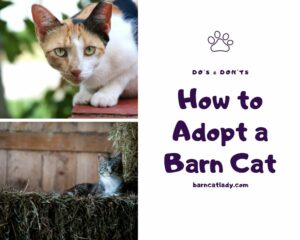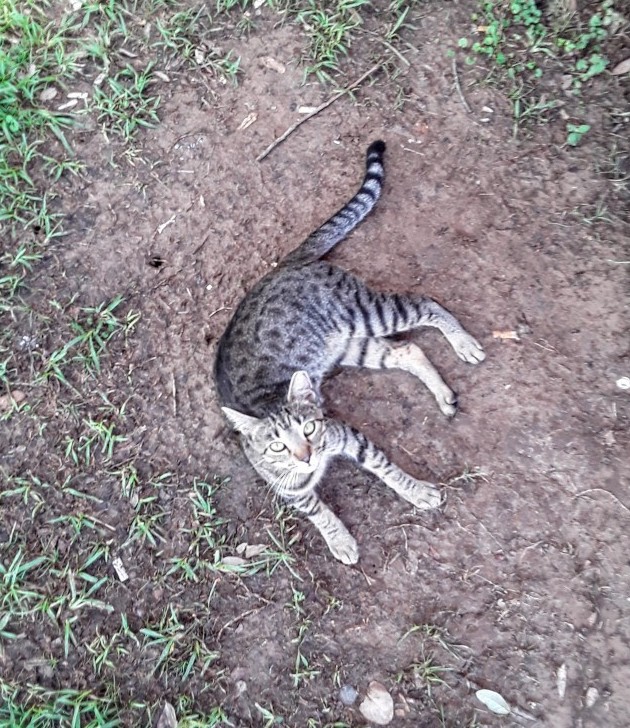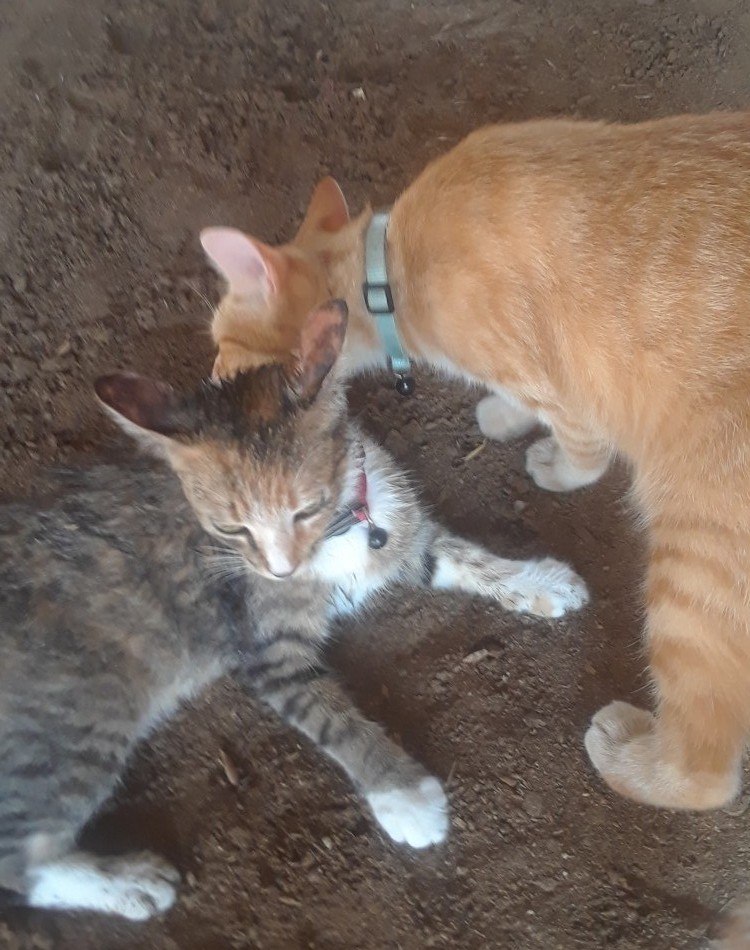
You have a rodent problem and decided that you need a barn cat. But you’ve never owned working cats before. So you want to know how to adopt a barn cat for your farm, shop, warehouse? Read on!
Unfortunately, people have the habit of overthinking this. Some people believe they need to adopt kittens so they can ‘train’ them to be a barn cat, or keep a breeding queen pushing out kittens so they have trained mousers, or even that you don’t feed working cats so they ‘hunt better.’
All of these are common misconceptions people have. Some of these misconceptions are extremely cruel. But let’s discuss what to do when looking for a barn cat to adopt!
How to Adopt a Barn Cat
- DON’T adopt a kitten!
Do NOT adopt a kitten from a rescue, shelter, or your neighbor, and put that poor baby outside.
This is one of my biggest pet peeves regarding barn cat ownership.
Kittens are PREY.
Kittens can easily be killed by hawks, owls, coyotes, mountain lions, snakes, and a whole lot more. Heck, if you have large rats, your kitten could be seriously injured if they don’t run in fear. Most kittens born outside do NOT survive their first year. This is because a lot of them are EATEN.
Yes, cats can be prey too, but kittens are ALWAYS prey. Cats are usually too big for most birds of prey to carry off, but kittens are the right size for them. Cats CAN be carried off by the larger species, but it’s usually the kittens who get snatched.
It does not matter if an animal is a ‘working’ animal and not a pet, YOU are responsible for the animals under your care. ALL animals, working or not, deserve proper care (food, water, veterinary care to prevent suffering), shelter, and protection.
Working cat life is dangerous enough for adults even if you take every precaution. Don’t sentence kittens to death this way.
Kittens do NOT hunt well.
If you adopt a kitten for your barn, it will be a long while before that kitten is good enough to hunt reliably. Most preditors as adults miss more prey than they catch. Imagine how many a kitten will catch? Zero.
After 6-7 months old, they might be pretty good. If you adopt a little baby, it’s going to be months or a year before they’re useful for rodent control. It takes around 12 months for a kitten to finish growing, and another year to finish the maturing. So why bother with kittens?
Kittens DIE outside.
Whether in a barn or a yard or the forest, kittens die often. Kittens are young, clumsy and inexperienced. Outside of them being prey, they can die from accidents, illness, and crossing the road because they don’t know any better and don’t have the experience to know how to get out of dangerous situations. They panic and run towards ‘home’ whether or not a car or horse is in the way.
Don’t adopt kittens for your barn! Do not put kittens outside. It’s inhumane and makes no freaking sense when there are easier ways to get yourself a barn cat that can almost immediately help you with mice.
- DON’T adopt a pet!
Cat or kitten, friendly cats who make good pets should be pets, NOT working cats!
Most pet cats or kittens born indoors do NOT do well when suddenly put outside alone. Sure, some indoor/outdoor cats do okay, but a lot of them are terrified, feel lonely, and don’t understand why they aren’t ‘home’ anymore, or why their new person doesn’t allow them inside.
Cats aren’t big fans of change anyway but if you stick an indoor cat outside suddenly, many of them freak out and get lost immediately. They feel stressed, upset, fearful, and alone. Nothing is worse than a barn cat with separation anxiety. The yowling is heartbreaking.
Pet cats aren’t properly cautious, either. Either they are straight out terrified or they fear nothing and walk into horse stalls to be killed.
Pet cats are friendly, loving, and deserve to be safe indoors. If a cat can be a pet, he SHOULD be a pet. It’s safer for them, they live longer lives, and they get love. If you put a pet cat or kitten in your barn, you will be taking away their chance at a loving home and shortening their lives. Don’t do that. - DO adopt a community cat!
Call your local animal control or municipal shelter and ask them if they have any cats you can adopt as a barn cat.
Call your local Trap-Neuter-Return group and ask if they have community cats that need a good barn home.
If you know any cat caretakers, ask them if they have cats who need a barn home!
Even if your shelter does not have a barn cat program, chances are they will have a feral or semi-feral cat that is in danger of being euthanized if people like us do not take them into our barns!
Shelters and rescues will also make sure these cats are already fixed, vaccinated, and healthy before relocation to their new barn. The adoption fee for a working cat is often eliminated completely, though some places give a reduced adoption rate instead. Win-win for everyone!
Why should you adopt the unadoptable?
Feral cats, cats with spraying issues, and even friendlies that refuse to live inside need to be relocated occasionally to farms if their outdoor home is no longer suitable. What happens if barn owners don’t adopt? These cats either get euthanized or live in cages waiting, for YEARS, to find a new outdoor home.
These cats have lived outside their entire lives, roaming free. Their home was their territory outdoors. But even cats who call the outdoor world ‘home’ can become homeless when humans start building roads and houses. Or when property owners demand their removal.
You will not only save their lives, but you will be adopting cats that are used to being outside, may not even LIKE humans, and prefer the company of other cats.
There are no reliable estimates of the number of unowned cats in the United States, but the estimates often range between 60 million to 160 million! That’s tens of millions of cats living outside. Tens of millions of cats without regular food or shelter, killing mice or other wildlife just to survive.
These cats often have dangerous lives that are cut short. Most have never had the most basic of veterinary care, such as deworming, treatment for illnesses or injury, vaccines, or a spay/neuter surgery. Some live in such horrible conditions, just trying to survive off of garbage and a human’s occasional kind offering of food. Some are completely wild.
These cats can benefit from the care and shelter of a barn home. It’s a step up for them. They go from the streets to a barn. They get shelter, food, basic veterinary care, and even love. From unwanted to needed!
- DO spay and neuter your barn cats!
Cats reproduce at a phenomenal rate. You WILL be overrun by cats and kittens in a couple of years. You can read the benefits of spaying and neutering your cats here.
Getting your barn cats fixed will have a few benefits: reduced territorial marking (spraying), reduced fighting, and it eliminates the risk of some cancers. It also helps keep cats healthier as some cat diseases are spread more easily by mating or fighting. It reduces roaming, injuries, and obviously kittens.
I also find fixed cats are better mousers for the barn. Fixed cats are calmer, happier, healthier, and stick closer to home. Unfixed cats are focused on their hormones. When you feed unfixed cats, they rarely bother to hunt and instead focus MORE on finding a mate and they’re gone a LOT doing this. Fixed cats have FUN hunting mice and don’t have hormones.
If your cats are dying faster than they can reproduce, you are NOT caring for them. There are ways to help keep them safe from predators, as well as illnesses and other causes of cat mortality. There is no reason they can’t live years in a barn. There is no reason to lose a large number of cats in a year.
There is no reason for a barn to need breeding cats when feral cats need barn homes. - DO adopt more than one!
Cats, despite misconceptions, are not solitary creatures. They HUNT alone, but they crave companionship and love too. Even feral cats need a friend: they would just rather have a cat friend than a human friend!
Never adopt a single community cat for your barn. Adopt two! Or more! They are happier this way. They are more likely to stick around.
Another reason for adopting two or more community cats is because not all cats will hunt. It’s laziness, not training. They just don’t have any interest.
The scent of cats will repel prey animals, including mice, from the barns, though. So even non-hunting cats are useful! But not all mice or rats will be repelled, so two (or more!) cats will ensure at least one will hunt.
Plus you will be saving more than one life.
- DO acclimate your barn cats to their new home
Please follow the shelter or rescue’s relocation protocol EXACTLY!
A cat who lives outside can STILL get lost if you dump him in a strange place. This is especially true of feral cats who will have NO reason to stay. At all.
If you didn’t adopt from a rescue/shelter, then you can follow my feral cat relocation advice. - Provide food, water, access to shelter, as well as basic veterinary care.
Barn cats need food and water, just like pets. They need to have access to the barn or garage or shop to escape bad weather, the cold, or the heat.
And yes, they will need some basic veterinary care. You definitely want them rabies vaccinated. I prefer to also get my barn cats completely vaccinated whenever I have to have them seen by a vet for whatever reason. I don’t trap and traumatize them yearly for vaccines, but if they have to go in for treatment for a wound or something, I ask to get their vaccines then.
Barn cats should also be dewormed and given flea medication on a regular basis. This keeps them healthier and more comfortable. Plus reduces the chance of other animals catching parasites from the cat or getting a flea infestation around your barn.
If a cat gets injured or sick, it is against the law to allow that cat to suffer. Legally, you are adopting these cats. You are required to provide veterinary care to prevent the suffering of all animals under your care. So not only is it the right thing to do, it’s illegal NOT to. - No training required!
Cats hunt. It’s what they do. Even bottle-fed kittens with no mom will start hunting. It’s a huge amount of instinct. Mama cats might help their kittens get the hang of it quicker, but honestly, you don’t need a barn cat mama to teach her kittens to be an effective mouser.
Any feral or community cat who has lived outside their entire life KNOWS how to hunt. They had to hunt for survival.
But just saying, if you decide to get a house cat to ensure your house is mouse free? House cats know how to hunt too.
It’s in their very genes.
Don’t Breed, Adopt!
There are too many kittens being born only to suffer and die. There is never a reason to allow your barn cats to breed. There is never a reason to stick a kitten out in your barn that could be a beloved, spoiled, and SAFE indoor pet.
There are millions of reasons to adopt a feral cat instead.
By adopting a feral or community cat, you will be doing your part to stop cat overpopulation, as well as help to reduce their impact on the environment AND saving their lives.
Adopt a barn cat (or two!) today!

I used to watched cute cats video shared in FB and Youtube but adopting one never crossed my mind. Aside from the fact that my wife is not fond of feline creatures, I know that I cannot really take care of them. Your article shows a different angle to look at – the usefulness of a barn cat. Now I can recommend this to my friends who are in need of a barn cat with all the necessary information needed. This post is really helpful.
Thank you!
Oh! These are really some very great tips that I know would really come very handy over the long term because I know it can help to save some kitten’s life. I was actually planning to adopt a barn cat and I saw that you have warned against kittens. I am really appreciative of the fact that I will not be endangering any kitten. This post is quite very informative.
Thank you for not putting a poor kitten outdoors!
You give a great perspective on barn cats. Our pest control guy told us the best way to get rid of rodents is to have a cat. We never got one but a neighborhood cat sometimes strolls into our yard at night, so maybe he/she’s been doing the dirty work.
Great tips and advice on adopting cats for this job, not kittens. I’m not a cat person, but the rest of my family are. Will share post with them. Thanks!
Hi! You’re right, that neighborhood cat is likely trying to thin the rodent population and probably strolls through your yard, specifically for that. Thanks for visiting!
It’s so sad that people are having kittens as barn cats and they are not surviving. It’s so sad to read this. Thank you for this post on adopting a barn cat and how to adopt community cats. Gosh, that figure of between 60 million to 160 million cats living unowned is staggering, isn’t it?
Hi, Emma! Yes, it’s definitely sad. Scary, too, but if you love cats, it’s so sad. Cats born to grow up feral, to die young, and people keep letting their pets breed litter after litter after litter. Thanks for visiting!
Hello! Our neighbor’s barn cat is about to have kittens soon. We would like to adopt 2 of them. What age do you recommend taking them away from mom? Also, they will be in a large crate inside our barn at first. We have a dog door and I don’t want them to be able to get out on their own until they are older. What age or how long do you recommend they can leave the crate?
Hi, Stephanie,
Unfortunately, I don’t recommend adopting kittens at all. Kittens are prey, not predators. 50-75% of all kittens don’t live to see 1 year old in outdoor homes. Everything eats kittens outside, from coyotes and hawks or owls to raccoons and opossums. They also won’t be effective hunters until around 6+ months old, if not longer.
I instead recommend adopting poorly socialized or feral cats that can’t be adopted into homes or don’t WANT to be adopted into homes. These usually come already fixed, vetted, and given vaccines before relocating to barns/farms. They also can start hunting after their acclimation/confinement period of 3-6 weeks, depending upon where you adopt. And they tend to survive better and can live 10+ years if well taken care of.
Kittens would have to be closely supervised as any hawk/eagle can grab one right from in front of you before you can blink if they’re right outside in the yard. They would have to be confined any time they aren’t supervised, and that will last until they’re big enough (nearly adults) to only be in danger from giant birds and coyotes.
I wish I were exaggerating, but I’m really not. Kittens are not a good idea. I’ve received many requests for advice on how to keep kittens safe when they lost the entire litter or the one they adopted got hit by a car backing out or just disappeared within two days. That’s not even counting my own experience watching kittens disappear or die before I finished TNRing the property. Cats aren’t 100% safe, but they ARE safer.
Good luck!
UGH. My boss showed up with a 6 week old kitten he was going to make the ‘warehouse’ cat. He’d got him from some guy at a Walmart parking lot. I am in charge of the animals in the warehouse, and he wanted me to put this tiny kitten OUTSIDE at 5 pm. Our business dead ends on a cattle farm with coyotes, big dogs, raccoons and every other kind of varmint..I flat refused, we had a horrible fight but that kitten was NOT put outside. She stayed INSIDE and went home with someone on the weekend. She’s 9 years old now and a true diva but she can hunt like a SON of a gun…she has even brought in hawks..much to our dismay. I still shake my head at the idea of putting a 6 week old kitten OUTSIDE by herself…sheesh..
Oh my goodness! Thanks from saving her from that fate! 6 week old kittens born outside usually have mothers and siblings! And still they often die. But by herself at 6 weeks? She’d have most certainly died. Some people just don’t understand.